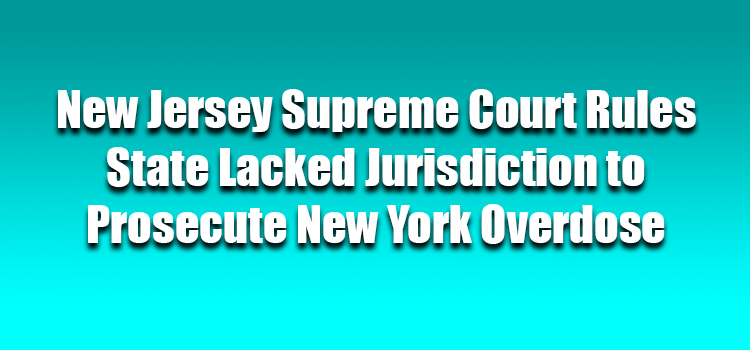In State v. Noel Ferguson, the Supreme Court of New Jersey held thatNew Jersey lacked territorial jurisdiction to prosecute three defendants for a drug-induced death that occurred in New York. While New Jersey criminalizes illicitly distributing drugs that cause death to the user as a strict-liability offense, New York does not.

Facts of the Case in State v. Noel Ferguson
Defendant Shameik Byrd sold heroin to defendants Noel Ferguson and Anthony Potts in Paterson, New Jersey. Afterwards, Ferguson and Potts returned to their home state of New York where they sold the heroin they purchased to Kean Cabral. Cabral died of an overdose after taking the heroin originally sold by Byrd.
The three defendants were charged with multiple violations of New Jersey’s drug laws and with the first-degree crime of distributing heroin that caused the death of Cabral in violation of the strict-liability drug-induced death statute (N.J.S.A. 2C:35-9). The elements required to prove a violation of the strict-liability drug-induced death statute are:
- the defendant distributed a controlled dangerous substance;
- the defendant did so knowingly or purposely;
- the victim used the substance distributed by the defendant; and
- the victim died as a result of the use of the substance distributed by the defendant, and the death was not too remote in its occurrence or too dependent upon the conduct of another person.
Each defendant moved separately to dismiss the strict-liability drug-induced death charge on the ground that the State lacked territorial jurisdiction to prosecute the offense. The trial court dismissed the drug-induced death charges filed against Ferguson and Potts, reasoning that the State lacked territorial jurisdiction because neither the conduct (the distribution of heroin) nor the result (the death of the victim) — the necessary elements for a conviction under N.J.S.A. 2C:35-9 and for territorial jurisdiction under N.J.S.A. 2C:1-3(a)(1)— occurred in New Jersey.
The trial court found that the State had territorial jurisdiction to prosecute Byrd for Cabral’s drug-induced death because the necessary conduct for a prosecution under N.J.S.A. 2C:35-9 and for territorial jurisdiction — the distribution of heroin — occurred in New Jersey. The Appellate Division affirmed the dismissal of the drug-induced death charge against Ferguson and Potts and sustained the charge against Byrd for reasons similar to those articulated by the trial court
New Jersey Supreme Court’s Decision in State v. Noel Ferguson
The New Jersey Supreme Court affirmed as to Ferguson and Potts and reversed as to Byrd.“In summary, New Jersey does not have territorial jurisdiction to prosecute Ferguson and Potts for Cabral’s drug-induced death because they did not distribute drugs in New Jersey or cause his death in this State,” the court held.
“We also hold that New Jersey does not have territorial jurisdiction to prosecute Byrd for Cabral’s death because New York has no criminal law punishing as a strict liability offense the drug-induced death of Cabral,” the court added.
With regard to Ferguson and Potts, the court reasoned that because Cabral’s death occurred in New York (the result element), the issue for jurisdictional purposes under N.J.S.A. 2C:1-3(a)(1) was whether Ferguson and Potts distributed the heroin in New Jersey (the conduct element). It went on to conclude that Ferguson and Potts made no “attempted transfer” or “delivery” of drugs to Cabral in New Jersey. Rather, after they purchased the drugs in Paterson, Ferguson and Potts returned to New York, where they sold drugs and delivered heroin to Cabral, acts that constituted distribution.
In the case of Byrd, the New Jersey Supreme Court concluded that his case fell within the exception to territorial jurisdiction delineated in N.J.S.A. 2C:1-3(b), which provides that subsection (a)(1) will not apply when “causing a specified result . . . is an element of an offense and the result occurs . . . in another jurisdiction where the conduct charged would not constitute an offense, unless a legislative purpose plainly appears to declare the conduct criminal regardless of the place of the result.” As the court explained:
Here, “conduct charged” means the strict- liability offense of a drug-induced death, N.J.S.A. 2C:35-9. That offense is not punishable as a crime in New York. Therefore, New Jersey does not have territorial jurisdiction “unless a legislative purpose plainly appears to declare” that a violation of N.J.S.A. 2C:35-9 is prosecutable in this State, regardless of the place where the drug- induced death occurred.
The New Jersey Supreme Court went on to hold that it couldn’t discern a plain legislative purpose calling for Byrd’s prosecution for the strict-liability drug-induced death of Cabral, when New York, where the death occurred, would not prosecute such an offense.
